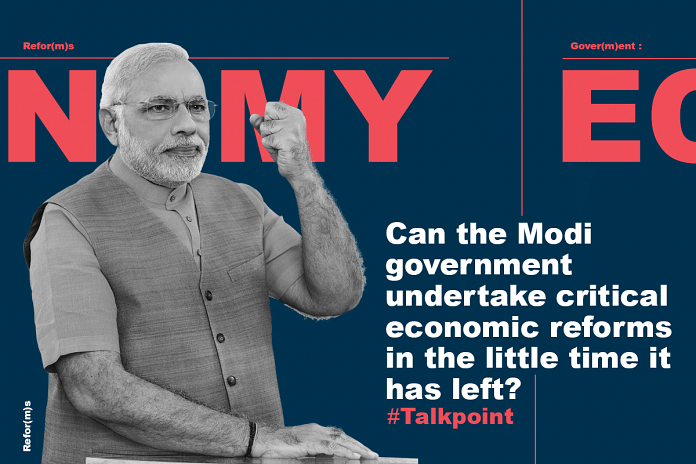The Economic Survey was tabled in parliament today and comprehensively analyses the current economic situation— from the impact of GST to the detrimental effects of climate change on agriculture. It also advises a substantial reduction in avoidable tax litigation, pending cases in the courts, and a renewed focus on investment.
ThePrint asks: Can the Modi government undertake critical economic reforms in the little time it has left?
Out of the box reforms may not be conducive at this stage
 Radhika Pandey
Radhika Pandey
Consultant at the National Institute of Public Finance and Policy (NIPFP)
The government has undertaken various reform measures, including the GST, to rationalise the tax structure and the Insolvency and Bankruptcy Code (IBC) for prompt resolution of stressed corporate assets.
Reform measures to attract foreign investment flows have also gained momentum in the past one year. It is imperative to take stock of these reforms and steadily remove the bottlenecks in their seamless execution.
Anaemic private investment continues to be the pain point. Rise in inflation driven by crude prices may be a challenge for fiscal consolidation and may pose a drag on economic growth. Given that this is going to be the last full budget of the NDA government, out of the box reforms may not be conducive at this stage.
At the same time, any temptation to bring in populist measures that are untenable in the medium term should be avoided. There are complex choices and decisions to be made. However, there are some low hanging fruit that could improve the business climate.
A key reform measure that could be undertaken is to bring in the Financial Resolution and Deposit Insurance Bill (FRDI Bill) for prompt resolution of banks and financial firms. Along with the IBC, it will complete the package of reforms on rationalising the exit mechanism.
In parallel, non-bank sources of financing like the bond market need to be given a fillip. We have seen a resurgence of activity in the bond market. This needs to be propelled further. Economic survey stresses on creating a conducive environment for small and medium enterprises to invest. This should be a policy priority.
If this government manages any reforms, it will be by accident
 Ashok Desai
Ashok Desai
Economist and former Chief Consultant in the Ministry of Finance
The government can do myriad reforms by 2019 if one accepts its penchant for labeling insignificant and sometimes malignant policy measures as reforms. If we ignore its inclinations and look for a more objective definition, it should include tackling India’s poor showing in international comparisons — poverty, productivity, ease-of-doing-business, education, industrial stagnation, openness and so on.
As all its budgets and economic surveys have shown, these are not the government’s priorities. Soon after coming to power, it dismantled the planning commission and transferred the funds it so saved to the states, whose commitment to long-term policies is weak and variable.
Its ability to lead the economy has been handicapped by three factors: the absence of supportive indigenous economic intellectuals, lack of a long-term vision, and a missing connection with the global economy.
The chief economic adviser to the finance ministry, imported from the United States, has done a commendable job of reading the Indian economy in a global context; but he has had no discernible influence on its policy.
The finance minister is best known for his optimistic but unfounded forecasts; he has shown no understanding of the machinery of economic development. He and his government will often make news by claiming to do reforms. But if it does resort to any reforms in the time left, it will be by accident.
The government’s priority will be increased focus on disinvestment and tax collection
 Deven Choksey
Deven Choksey
Managing Director, KR Choksey Investment Manager
The Economic Survey is always a wish list based on economic data. Overall I’d say that managing the budget and allocation of resources are an art as it requires taking into account permissible levels of resource management, which needs to be obvious and clear. In addition, the priorities of the government will depend upon the resources that the government has at its disposal.
The priority for the government, in my view, will be: a) increasing the focus on disinvestment to raise money and selling the stake in the public sector units (PSU); b) tax collection.
The priority would be to sell Air India, stakes in companies like NHAI and LIC that could easily fetch about Rs 1 lakh crore for the government.
These companies are the most sought after today with NHAI and LIC expected to result in Rs 5 lakh crore combined in market cap on listing and would see a strong demand from the investors.
Given that this is election year the focus of the government would be on implementation of projects that they have already announced like rural housing, road development, river linkages, and unitisation of agricultural land. This would connect with the people as it would benefit them and could result in securing political mileage among masses.
I also believe that with time, GST will work out to be the mood changer. We will be able to see a positive impact of the GST before the year is out.
Compiled by Deeksha Bhardwaj.



